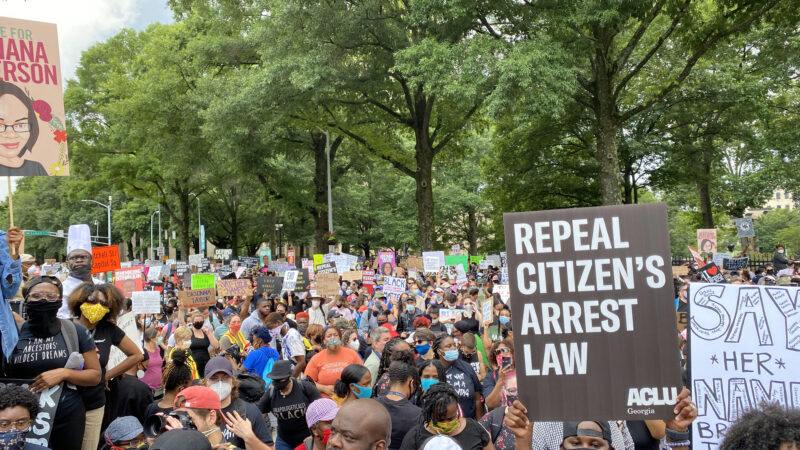Criminal Legal Reform
Our country’s mass incarceration system, rooted in the history of slavery, has devastated communities of color across the country, particularly Black communities, for decades.

What you need to know
790%
The federal prison population has increased by almost 790 percent since 1980.
3.73 times
In the United States, a black person is 3.73 times more likely to be arrested for marijuana possession than a white person is, despite approximately equal rates of use.
3,278 people
At least 3,278 people were serving life sentences without parole for drug, property, and other nonviolent crimes in 2012.
The U.S. leads the world in incarceration, and Georgia has one of the highest per-capita rates of people under correctional control in the nation. As civil rights laws expanded access for African Americans, the criminal legal system expanded, punishment increased, and civil rights were taken away. Civil rights advocate and author Michelle Alexander describes this as “The New Jim Crow.”
The Fulton County Jail
Over the past two years, the American Civil Liberties Union of Georgia has worked with a growing coalition of partners across Fulton County to emphasize the need to address mismanagement and overcrowding at Fulton County Jail.
Our recent reports, research among voters, and conversations with advocates and citizens from across the county clearly demonstrate that Fulton County residents overwhelmingly agree that too many people are held in Fulton County Jail for too long.
Constructing a costly new facility won’t address the pressing safety concerns stemming from the mismanagement, perilous conditions, and overcrowding at the Fulton County Jail. We developed three fact sheets that help shed light on the issues plaguing the Fulton County Jail system, how voters feel about those issues, and how we can fix them.
Learn more about the 2 Billion Reasons Fulton County Doesn't Need a New Jail
Jail Research Reports:
Senate Bill 63 - Georgia's Cruel Bail Bill
During the 2024 Legislative session, Gov. Brian Kemp signed Senate Bill 63 into law. This bill creates a two-tiered justice system where wealth determines whether or not people languish in jail.
SB 63 is cruel, costly, and counterproductive. Research shows that sweeping people into incarceration only increases crime and taxpayer costs, and yet Georgia locks up a higher percentage of its people than any other state in the country. SB 63 doubles down on that position, forcing even more people to languish in jail because they are poor or mentally ill. We are very disappointed that Gov. Kemp has sacrificed the good of Georgia for political gain. The ACLU of Georgia will challenge SB 63 in the courts to stop it from going into effect.
Citizen's Arrest Law
Georgia’s 250 year old citizen’s arrest law (HB 479), enacted shortly after Georgia seceded from the Union, had allowed private persons to make arrests to preserve slavery during the Civil War. The ACLU of Georgia worked diligently to repeal of this antiquated, racist, and dangerous citizen’s arrest law in Georgia which finally happened in 2021.
Policy Director, Christopher Bruce's 2021 testimony in support of HB 479, a bill to repeal Georgia's citizen's arrest law.
The Latest

Civil Rights Organizations File Lawsuit Challenging Georgia Law That Punishes People Simply for Being Poor

ACLU Reaches Settlement in Lawsuit Seeking to Reduce Population at Fulton County Jail

Fulton County Coalition Announces Launch With New Report On $2B Jail
Stay Informed
Sign up to be the first to hear about how to take action.
By completing this form, I agree to receive occasional emails per the terms of the ACLU’s privacy statement.
By completing this form, I agree to receive occasional emails per the terms of the ACLU’s privacy statement.
